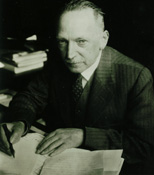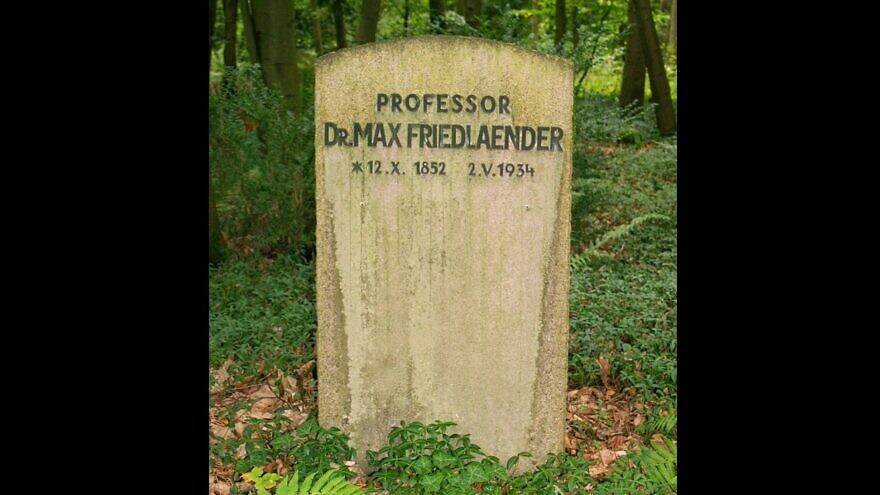German neo-Nazi and Holocaust-denier Henry Hafenmayer’s remains were recently buried in a plot that once held the remains of Jewish musicologist Max Friedlaender and which still features his gravestone.
Hafenmayer was convicted for incitement after sending Holocaust-denying letters to public institutions, gaining him notoriety among right-wing extremists before his death at 48 years old.
Friedlaender, who died when Hitler was in power in Berlin in 1934, was from a Jewish family but identified as “Protestant” in the burial registration slip. His cremated remains were moved to another plot in 1980, though the headstone was left and declared as a monument, said the BBC.
After photos from the burial show Hafenmayer’s urn placed in Friedlaender’s headstone—which the extremists covered with a black cloth displaying his name and a quotation from John 8:32: “And you shall know the truth and the truth shall make you free”—church authorities admitted that a “terrible mistake” was made that needs to be rectified.

Leah Floh, president of the Jewish community of Monchengladbach/Viersen in Western Germany, expressed to JNS that such mistakes only exist in “anti-Semitic fairy tales,” as the “Protestant church in Germany has big problems with Jews and especially Israel.”
Likewise, German student Vanessa Maas, 22, who attends Maastricht University, told JNS that “the people who buried the ashes knew exactly what they were doing.”
Originally from Trier, Germany, Maas is active in the Union of Jewish students in Germany and is currently undertaking an internship in Berlin, which involves the monitoring and combating anti-Semitism in Germany.
“Above all,” the student said, “this shows that anti-Semitism has arrived in the middle of society. … There must be more information about what anti-Semitism is, especially in official structures, and especially how it can be better prevented. It doesn’t just come from the right, from the left and from elsewhere. No, anti-Semitism also comes from the middle and is often hidden,” she maintained, suggesting that seminars and workshops about anti-Semitism are not being taken seriously enough in Germany.
Floh labeled the incident “a provocation of neo-Nazis” who believe “einmal Jude, immer Jude—once Jewish always Jewish”—and said that such a situation cannot be properly rectified.
“Is it possible to reanimate 6 million Jews and return them their lives?” she asked rhetorically. “Is it possible to return us our grandparents, who were killed in Auschwitz, Bergen-Belsen, Babi Yar or even buried alive? Who knows and can understand Jewish heartache and tragedy? Of course, the church will check if the relocation of the ashes is possible and will try to find a dignified burial site. … But is it possible to solve it at all?”
The fact that the Protestant church allowed a neo-Nazi hero to be buried in the plot of a famous Jew is a “slap in the face and offense to all the Jewish people,” she added, noting that anti-Semitism in Germany can very quickly become socially acceptable and even in fashion among the left, right and middle of society.
“That is what we see and feel in Germany at the moment. It is dangerous, tragic and hard to stop,” she said.
‘It makes me angry and sad’
Indeed, a recent survey initiated by the Action and Protection League, 22 percent of Germans were found to hold moderately anti-Semitic beliefs, while 6 percent were found to hold strongly anti-Semitic beliefs. One-quarter of Germans were found to believe that Jews exploit Holocaust victimhood for their own purposes.
According to initiator of the Europe-wide anti-Semitism study, Rabbi Slomó Köves, while this represents a relatively low prejudice when viewed among other European countries, Germany has one of the highest rates of anti-Semitic attacks among the 16 European nations with large Jewish populations.
“I knew that the recent rise in anti-Semitism in Germany was dramatic, but I didn’t expect to hear these high numbers,” said Floh, who attended the presentation of the survey in Brussels on Oct. 12, among other leaders of Jewish communities around Europe. “This makes the situation even more complicated and threatening.”
“It makes me angry and sad that something like that still happens in the 21st century,” said Maas. “This is what is tolerated in Germany. In some ways, Germany does a lot in historical reappraisal; for instance, that it is part of the curriculum to learn about the Holocaust, but it is still far from being a champion in historical reappraisal, as it often claims.”
Berlin’s anti-Semitism official Samuel Salzborn reportedly filed a criminal complaint at the justice department, saying in a Guardian quote, “it is obvious that right-wing extremists deliberately chose a Jewish grave in order to disturb the eternal peace through the internment of a Holocaust denier.”
He added that “it must now be quickly examined how quickly the Holocaust-denier can be reburied to no longer disturb the dignified memory of Max Friedlaender.”


























